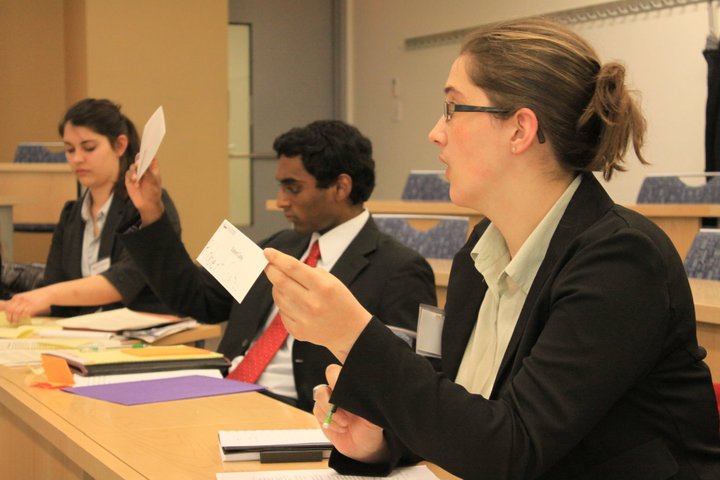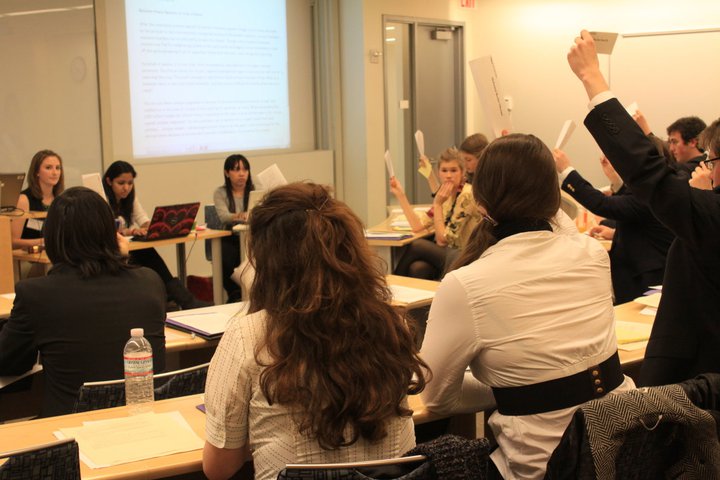Georgetown University was named Outstanding Delegation, winning 2 gavels, and 6 awards in total, while fielding a team of 8 delegates.
Teams from Columbia, Rutgers and Washington University in St. Louis also turned in notable performances, each winning multiple awards.
Click the button below to learn more about the conference!
In all, NYUMUNC had 135 delegates, from 13 schools, competing in 9 committees, all operating in one universe in a simultaneous joint crisis.
The 9 committees represented at NYUMUNC were the US National Security Council, the US Executive Office of the President, the Russian Cabinet, the Chinese Politburo Committee, the Nigerien cabinet, the African Union Specialized Technical Committee for Stability and Centralization, the Movement for the Emancipation of the Niger Delta, and two Nigerian committees.
Delegates came into the conference unaware of the presence of MEND within the NYUMUNC universe, as it was a classified committee. The other committees however quickly became aware of MEND, as the committee conducted several successful attacks and kidnappings within the first few hours of the conference.
Furthermore, delegates came into the conference expecting only one Nigerian committee, a Nigerian Cabinet. However, at the beginning of the conference, the Nigerian committee was split into two committees, a Nigerian cabinet that was loyal to the President, and a Rebels committee that was headquartered in North Nigeria hoping to overthrow the President. During the first committee session, several delegates from the Nigerian Cabinet defected to the Rebels committee, and remained with the Rebels for the rest of the conference.
Through the course of the weekend, the civil war between the Nigerian Rebels, who decided to name themselves People for a Free Nigeria, and the Nigerian Cabinet escalated, with both sides issuing many complex battle orders. As the conference wore on, the other committees got themselves involved in the war as well, with the US supporting the Nigerian Cabinet, China supporting the Rebels, and Russia attempting to make deals with both sides.
While the civil war was being fought predominantly in the North, MEND carried out several large attacks in the South which required the Nigerian Cabinets attention. Subsequent MEND attacks on Russian GAZPROM facilities led Russia to increase its private security forces in Nigeria, and engage in a war with MEND.
Amid all the instability in Nigeria, Niger had to deal with a refugee crisis as thousands fled the rebel controlled territory in Nigeria and came into Niger. Niger also formulated a successful plot to engage Russia and China in a bidding war for Nigerien uranium resources, lobbied the AU successfully to reinstate Niger’s membership, and had several discussions with the US regarding humanitarian aid and fighting al-Qaeda linked groups in Niger.
With the situation in Nigeria devolving, the African Union decided to change the mandate of its peacekeeping forces, allowing them to fire without first being fired upon, and then deployed 30,000 peacekeepers to the border of the rebel controlled territory, hoping to prevent both sides from engaging in further combat and push them to the negotiating table. For this action, the AU STC was given the Best Committee Award at NYUMUNC.
Finally, the dynamic that developed between the two US committees led to some heated debate between them. President Obama’s political and economic advisers in the US EOP committee seemed committed to US action in Nigeria, believing that it would be a good political move and increase US access to Nigerian oil. The US NSC on the other hand took a much more cautious approach, not wishing to commit significant resources to the Nigerian theater. As the situation developed, this division increased further, and it took two joint-sessions between the committees for the US to come to a unified policy on Nigeria.
All in all, NYUMUNC built upon the successes of its first iteration last year, and provided an innovative experience that delegates seemed to really enjoy.




